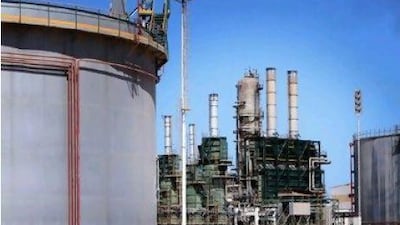Oil wells in Libya that were dormant during six months of civil war are expected to be running within "days", according to a rebel official.
The announcement came as rebel forces were encircling what is thought to be Muammar Qaddafi's final stronghold.
"In the next few days we expect a lot of oil wells will be rehabilitated," said Ali Tarhouni, the oil minister for the National Transitional Council, the rebel government.
Foreign oil and gas companies are also preparing for a swift return to business.
Eni, the Italian energy company that was Libya's biggest foreign investor before the conflict, set a target to bring a Mediterranean gas pipeline back online by October.
The fresh estimates for reviving Libya's most important industry are good news for oil and gas consumers as well as the rebels.
Oil and gas revenues are critical to the success of the rebels, who have claimed a military victory in Tripoli but must now restore basic services such as power and water supply as well as create a government from scratch.
Before the uprising, Libya pumped 1.6 million barrels per day (bpd) of oil, which accounted along with gas sales for an estimated 80 to 92 per cent of government revenue.
Those supplies were all but wiped from the market as foreign oil companies evacuated employees and fighters targeted refineries and export terminals.
The loss of Libya's high-quality crude from world markets, where it represented 2 per cent of supply, sent the oil price as high as US$127 a barrel in recent months. Yesterday Brent, the European benchmark, was slightly down to $113.63 a barrel.
Estimates of how long it will take to bring production back to pre-conflict levels range from six months to three years.
"You could have wild estimates about targets and that is fair," Ahmed Jehani, the rebel minister of reconstruction, said last week in Dubai. "But it is not always something that you get right."
Yesterday Paolo Scaroni, the chief executive of Eni, admitted the damage had not been fully assessed and that his company's target for restarting its gas pipeline could be "a bit ambitious".
"We still have not been to Mellitah, where the gas is channelled, so we do not know the state of the installations, but restarting gasfields is much easier than oilfields," he told the Italian news agency Ansa.
A concern for foreign companies deciding whether to send staff back to Libya is safety.
The new head of Libya's state producer said security at desert oilfields was being strengthened and pre-conflict pumping levels could be reached in 15 months.
"Once our fields are secure we need to make sure we clear the mines," said Nouri Berouin, the rebel-appointed chairman of National Oil Corporation. "Building up output will require logistical support and we might need our foreign partners."
Mr Berouin succeeds Shokri Ghanem,a longtime technocrat and former prime minister who defected in May to throw his support behind the rebels.
The man who represented Libya as its de-facto oil minister at Opec meetings and served as its primary interlocutor with foreign oil companies has yet to claim a spot in the post-Qaddafi government.
This week Mr Berouin vowed to open up the state producer's operations, long known for their opacity.
"We are going to make it more transparent and national oil companies will be more independent," he told Reuters from the rebel government's headquarters in Benghazi.
That could be good news for foreign oil companies, said Samuel Ciszuk, the Middle East energy analyst at IHS Global Insight in London.
"The problem in Libya was it was so incredibly opaque that it was a system which was possible to manipulate for those who had the power," said Mr Ciszuk. "Often oil companies found themselves on the receiving end of pressure and sometimes extortion. It was a predatory regime.
"A lot of companies realise that in the most transparent systems, they're actually the most secure."
* with agencies

